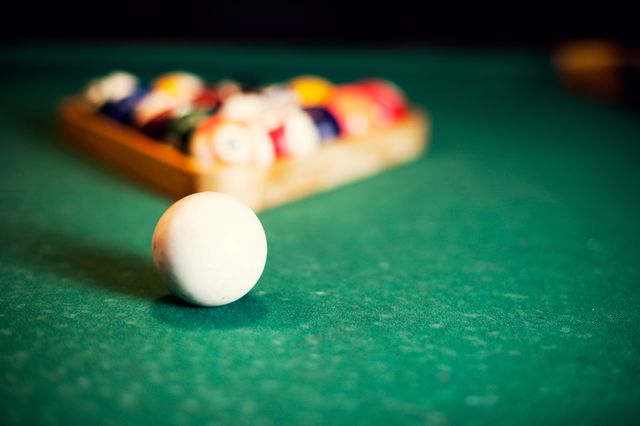The two most common types of pool cues are wood and fiberglass. Which one is better?
The difference between the two is that wood is harder, but it also has a lot more give to it. Fiberglass tips are more rigid and offer less give, but they can be made to perform better than wooden ones.
The debate between wood and fiberglass pool cues continues to be a hot topic. Some people prefer the traditional feel of wood, while others like the lighter weight and more durable feel of fiberglass.
Many people who play pool in a competitive environment want to use the most durable material available. This is because they need to be able to withstand heavy use without breaking down.
There are pros and cons for both types of materials, so it really comes down to personal preference as well as what your playing environment requires.
Fiberglass cues are made from a material called fiberglass that is composed of glass fibers. The material is stronger than wood and has a similar weight to it.
Fiberglass cues are typically more expensive than their wood counterparts. They also require more maintenance such as oiling and waxing.
Cue sticks are the most important tools in a pool player’s arsenal. A good pool cue can be the difference between a winning shot and losing one.
There are many factors that go into determining which pool cue is better than another, but regardless of the type of wood or fiberglass used, there is one thing that all good cues have in common: balance.
The purpose of this article is to provide you with some insight into what makes a great pool cue as well as to help you decide which type of cue stick will work best for you.
What is the best material for a pool cue?
A pool cue is a long, thin stick with a rounded end and usually covered with leather or cloth. The cue is used to strike the white ball that is racked on the center of a billiards or pool table.
The material used in the construction of a pool cue varies depending on its use and it can be made from wood, metal, fiberglass, carbon fiber, or other materials.
There are many materials that can be used to make a pool cue, but the best material is usually a combination of two or more. For example, the best material for a pool cue would be wood and fiberglass. Wood is strong and has great elasticity while fiberglass is durable and light weight.
A pool cue is one of the most important pieces of equipment in a pool hall. It is used for playing billiards, which is a game that involves moving balls around a table with cues.
The material that the cue should be made out of is not just about how it feels to hold and hit the cue ball. The material also has an impact on how it plays and impacts the quality of each shot.
The best materials for a pool cue are usually wood, but they can also be made out of other materials like plastic or metal.
How do I choose the right pool cue?
If you are not a professional player, you need to choose the right pool cue for yourself. There are a few things that you should look out for when choosing your pool cue.
• The shaft
• The ferrule
• The tip
• The butt cap
• The weight of the cue
Pool cues are one of the most important pieces of equipment in any pool hall. But what makes a pool cue good?
There is no one-size-fits-all solution to this question, but it can be answered by understanding the different types of cues. This article will help you find out which type you should buy and how to choose from them.
Pool cues come in different types, with each type having their own strengths and weaknesses. There are straight pool cues, break cues, pro models, soft tips, and more. If you’re looking for a particular type or style that isn’t listed here, then maybe your best bet is to ask your local pool hall owner for advice or try something new on your own!
Choosing the right pool cue is a daunting task. There are a lot of factors that go into choosing the best pool cue for you.
The following are some of the most important factors to consider when choosing the best pool cue:
-What type of player am I?
-What type of game do I play?
-How often do I play?
-Do I prefer a more traditional or modern design?
-Do I have any specific style cues in mind that I want to play with?
Introduction: When you are looking for your next pool cue, there are many things to consider. Here’s how to make sure you don’t pick up something that will not work well with your game or style.
What weight pool cue do professionals use?
Professional pool players use a weight of around 18 to 22 ounces for their cue. This is because the weight of the cue affects how the ball moves on the table and how it bounces off of cushions.
The weight also depends on personal preference and style. Some players use a heavier cue for power shots, while others use lighter cues for finesse shots.
A pool cue is a long stick with a round, convex metal tip at one end and a round or octagonal head on the other. It is used to strike the ball, usually billiards or snooker.
Pool cues are typically made of wood, although:
– Some pool cues are made of fiberglass, phenolic resin (FRP), carbon fiber, or other materials.
– The most expensive pool cues are made of exotic woods such as bubinga, cocobolo, and ebony.
– In England, the term “cue” refers to any stick used in games like golf and tennis; these sticks are often shorter than those used for playing pool.
– Pool cues have also been manufactured from a number of non-wood materials
Professional pool cue weight is a topic that is often discussed among players. There are many different opinions on what weight of a pool cue is best for a player to use.
What cue ball do professionals use?
Cue ball is the most common billiard ball and it is usually made of solid rubber.
The cue ball used in professional billiards is typically white, with a smooth surface for better performance. The size of the cue ball varies depending on how much it weighs – from 8 oz to 16 oz.
Professional Cue Ball:
-
Professional Cue Ball (8oz)
-
Professional Cue Ball (16oz)
Cue balls are used in billiards, snooker, and other games that require a ball to be hit with a cue stick. They are generally made of wood and have a white spot painted on the surface to help players locate the ball more easily.
Professional cue balls are usually made of hardwood and laminated with special materials that allow them to have better performance. The surface is usually coated with rubber for grip and for protection from wear and tear.
Cue balls are used in professional billiards to hit the ball into the pockets of a table. Cue ball is also known as the object that sticks out of the end of a pool stick and is used to strike a particular ball.
In billiards, there are three main types of cue balls:
1) Normal cue ball;
2) Jockey; and
3) Special cue ball. The normal cue ball is made from wood or composition material and is not very hard, while jockey cues are made from hard materials such as ivory, ebony, or bone. Special cue balls are made from materials such as plastic or cork that have a different feel than other types of cue balls.


